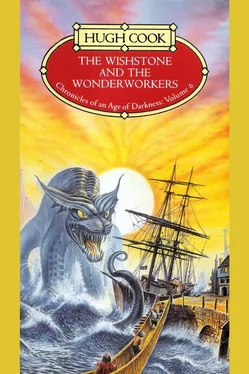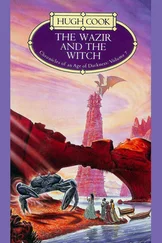Hugh Cook - The Wishstone and the Wonderworkers
Здесь есть возможность читать онлайн «Hugh Cook - The Wishstone and the Wonderworkers» весь текст электронной книги совершенно бесплатно (целиком полную версию без сокращений). В некоторых случаях можно слушать аудио, скачать через торрент в формате fb2 и присутствует краткое содержание. Жанр: Фэнтези, на английском языке. Описание произведения, (предисловие) а так же отзывы посетителей доступны на портале библиотеки ЛибКат.
- Название:The Wishstone and the Wonderworkers
- Автор:
- Жанр:
- Год:неизвестен
- ISBN:нет данных
- Рейтинг книги:4 / 5. Голосов: 1
-
Избранное:Добавить в избранное
- Отзывы:
-
Ваша оценка:
- 80
- 1
- 2
- 3
- 4
- 5
The Wishstone and the Wonderworkers: краткое содержание, описание и аннотация
Предлагаем к чтению аннотацию, описание, краткое содержание или предисловие (зависит от того, что написал сам автор книги «The Wishstone and the Wonderworkers»). Если вы не нашли необходимую информацию о книге — напишите в комментариях, мы постараемся отыскать её.
The Wishstone and the Wonderworkers — читать онлайн бесплатно полную книгу (весь текст) целиком
Ниже представлен текст книги, разбитый по страницам. Система сохранения места последней прочитанной страницы, позволяет с удобством читать онлайн бесплатно книгу «The Wishstone and the Wonderworkers», без необходимости каждый раз заново искать на чём Вы остановились. Поставьте закладку, и сможете в любой момент перейти на страницу, на которой закончили чтение.
Интервал:
Закладка:
Hugh Cook
The Wishstone and the Wonderworkers
FOREWORD
Mighty are the labours of the redactors of Odrum, and merciless is their diligence. As it endured redaction in the dungeons of Odrum, the Text which follows became encumbered by a full two million words of explication and interpolation. In the interests of convenience, readability and sanity, most of this overgrowth has been cut away.
The enormity of the labours expended by Odrum upon this Text boggles the imagination. Upon the foundation of this historical account there was erected a terrifying redactatorial monument complete with an elaborate apparatus of footnotes, screeds of etymological speculation and hundreds of thousands of words of textual analysis.
Only a few (a very few) of the comments by some of the more prominent redactors have been left to give a faint indication of the flavour of the Text in its redacted form. The rest of Odrum’s additions have been soundlessly elided. Which is only fair, since Odrum’s scholars were equally ruthless in their abbreviation of the Originator’s writings.
Common sense tells us that the reader needs no editorial help to understand a straightforward history such as this. Even so, a few words to explicate the Hermit Crab are in order. Drax Lira, Redactor Major of Odrum, plainly misunderstood and grossly underestimated this entity. The Originator of the Text knew better, yet never learnt of the Crab’s origins. In fact, the Originator knew not even the Hermit Crab’s name.
As it happens, the Hermit Crab originated in the fires of the local star. It belonged to a race of creatures which are not formed from flesh as we understand it, but instead exist as dynamic, highly localised modulations of probability. As a result of a theological dispute, the Hermit Crab was forced to flee from its fellows. Since to stay was to die, it abstracted itself from the inferno which had served it as a home for the better part of seventy million years, and fled into the unutterably cold wastelands of outer space.
At length, it reached a planetary surface. It was sick and injured by the time it made landfall on the shores of Jod, and therefore had no time for the fifty thousand years of careful thought and diligent analysis which would have been advisable under the circumstances. Instead, it had an urgent need to embody what was left of its life processes in corporeal form, lest those processes be altogether extinguished.
You must understand that the Hermit Crab was and is entirely lacking in divinity. Like us, it was and is mortal. In its original form, it was fit only for life in the seas of a sun. Therefore it found the shores of Jod entirely inimical, and was forced to evolve with extreme rapidity in order to survive.
As it was no god, devil or demon, the Hermit Crab lacked the skill to create organic form and process ex nihilo, and instead adapted what it found to hand. The first living organism it encountered was a crab of the type which is known to the Hindrix-Prodorgotz system of taxonomy as Thorbakrodomon Rantharchardaliz. Therefore the Hermit Crab adapted the biology of this animal for its own purposes, and dwelt thus thereafter on the shores of Jod.
Thousands of years passed.
During those millennia, the Hermit Crab slowly changed and adapted the form it had learnt. In nature, Thorbakrodomon Rantharchardaliz grows to no great size. A typical specimen will have a carapace which is scarcely a fingerlength across at maturity. However, the Hermit Crab found it inconvenient to remain at this size, since it was often attacked by seagulls. These it obliterated, thanks to those powers to modulate probability which it still retained from its earlier mode of existence. However, seagulls remained a danger, since even the Hermit Crab had to (and has to) sleep sometimes.
The soft-bodied castle crabs which live in discarded seashells can never risk growing beyond the size of the available armour. However, the Hermit Grab suffered no such limitation, since it was a true crab with its own exoskeleton which it could shed at will whenever it wished to enlarge itself. Hence it was able to increase its size until the depredations of seagulls were no longer a danger. However, increased size brought it to the attention of humans, who proved even more of a nuisance than the seagulls had been.
Many tragedies ensued in the long years before the Hermit Crab managed to learn the local languages, and to modify its anatomy so that it could vocalize its simple and understandable demands (for peace and quiet and an adequate source of nutrition). After that, life went more smoothly. And the Hermit Crab had the leisure in which to contemplate further changes to its organic structure.
Any form would have been a burden to the Hermit Crab, for, in its previous mode of existence it had enjoyed freedoms which we can scarcely comprehend. Imagine yourself reincarnated as a paving stone, and enduring several millennia of such entrapment. This will give you a measure of what the Hermit Crab had to suffer.
However, while any form would inevitably have been hard to endure, the Hermit Crab realized its frustrations would at least be diminished if it could assume human shape. It would gain freedoms of action and intercourse which were totally impossible while it remained trapped within a crab’s carapace.
Unfortunately, attempts by the Hermit Crab to modify its structure further always failed. First forms are like first languages: once learnt, they are near impossible to unlearn. In the end, the Hermit Crab realized it could not learn a second form without freeing itself of the first. It would have to step away from its flesh and (briefly, at least) exist once more as a disembodied modulation of probability in an environment totally unsuited to such a mode of existence. In theory, this was possible; if it decided to abandon crab-flesh for human, it had at least a 3 per cent chance of success. And a 97 per cent chance of dying a swift and painful death.
Such odds did not appeal to the near-immortal Hermit Crab, which therefore retained its first-found form. And suffered. Hence its somewhat grumpish disposition, its unambitious philosophical outlook and its eremitic mode of existence.
That is all the reader really needs to know about the Hermit Crab. Its name is (strictly speaking) irrelevant. However, for the record, let us note that the wizard Paklish once sojourned on Untunchilamon and was long in discourse with the Hermit Crab. (We mean of course Hablos Paklish the philosopher, not the brilliant but ill-fated Alkibiades Paklish, would-be domesticator of dragons.) It was the philosopher Paklish who bestowed upon the Hermit Crab its name, Codlugarthia, which in the Janjuladoola of Yestron South means ‘Son of Thunder’.
However, as you will see from the Text which follows, this name had quite fallen out of use by the year Alliance 4312.
AN OPENING EDITORIAL NOTE
This Text purports to be a true and correct account of certain events on Untunchilamon. However, as complete Verification has proved impossible, scholars are advised to treat it with caution. To accept it as the whole truth (or as nothing but the truth) would be rash, to say the least.
I myself have been to Untunchilamon and to Injilta-prajura in days gone by, during the rule of the late Wazir Sin. I then met some of those who feature in this Text, notably Justina Thrug (later to be the Empress Justina), Aquitaine Varazchavardan (then chief adviser to Wazir Sin), and Nixorjapretzel Rat (then an eager young scholar who earned himself some coppers by serving as my interpreter-guide).
I also saw the magical fountains of dikle and shlug which spring from the island of Jod, where I was shown the Analytical Engine by Ivan Pokrov. His explanations of the Engine were most unsatisfactory; I remain convinced that this conglomeration of titanium cogs is incapable of cognition, and that Pokrov is a fraud. The Hermit Crab I also saw, but all it said was ‘Go away.’ As I possess a parrot with a vocabulary far more extensive, I remain unimpressed.
Читать дальшеИнтервал:
Закладка:
Похожие книги на «The Wishstone and the Wonderworkers»
Представляем Вашему вниманию похожие книги на «The Wishstone and the Wonderworkers» списком для выбора. Мы отобрали схожую по названию и смыслу литературу в надежде предоставить читателям больше вариантов отыскать новые, интересные, ещё непрочитанные произведения.
Обсуждение, отзывы о книге «The Wishstone and the Wonderworkers» и просто собственные мнения читателей. Оставьте ваши комментарии, напишите, что Вы думаете о произведении, его смысле или главных героях. Укажите что конкретно понравилось, а что нет, и почему Вы так считаете.












